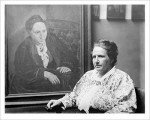Letter from Berlin: The Sane in Spain
BERLIN – U.S. President George W. Bush is in Europe during the snow-powdered last week of February, and naturally he’s chewing up the photo-op scenery.
The President and German Chancellor Gerhard Schroeder huddled in their topcoats on the tarmac at Frankfurt Mainz the other day as the cameras clicked away. But some far-less-noted events that unfolded in Europe in the last week are probably more substantial than the flimsy rhetorical efforts to pretend the frost isn’t on the ground in U.S.-European relations these days.
The big news that got relatively little North American attention was a display of sanity in Spain. On Sunday, Spain became the first European nation to approve the proposed European Constitution in a referendum. Three-quarters of participating Spanish voters, some 76 per cent, emphatically endorsed the next big step in the now half-century-long process of European unity. Turnout was a modest 42 per cent of the country’s 35 million eligible voters, but the absence of opposition to a European constitution in Spain may be as much an explanation for participation rates as indifference.
Recently elected Socialist Party Prime Minister Jose Rodiguez Zapatero called it “a transcendental decision about the future of a united Europe.” Transcendental? Maybe not. But it is a small sign of spring in a wintry, grumpy Europe. And it is true that Spain has been one of the most enthusiastic backers of the European Union since it became a member 20 years ago. In a recent study, 60 per cent of Spaniards identified themselves as European as well as Spanish, far above the 45 per cent average in the rest of Europe.
But notwithstanding the reign of the sane in the plain of Spain and all the rest of the “My Fair Lady” jingle, the idea of a single constitution for all of Europe has a long road ahead. It has to be ratified by the lately expanded EU’s 25 members, at least 10 of whom are planning to hold national referendums. Although Lithuania, Hungary, and Slovenia have already approved it by parliamentary vote, skipping the messy popular passage route, the Constitution is expected to face difficulties in several member nations.
Of course, outside of a few bureaucrats, polls show that almost nobody in Europe knows exactly what’s in the constitutional document, but everybody gets the main idea: More united Europe, less national sovereignty. And most sane people think that’s a good thing.
On the other side of the Iberian peninsula, the Portuguese Socialist Party scored a landslide victory in the country’s general election, taking 45 per cent of the vote and a 120 seat outright majority in the 230 seat Parliament. Socialist Party leader Jose Socrates will become the next prime minister of the relatively impoverished nation of 10 million people on the Atlantic coast. The victory means that all of Iberia is now governed by Socialists — though what the term “socialist” means these days is pretty much up for grabs. While the right-of-centre Social Democratic-Popular Party coalition and former government lost major support (down 12 per cent from 3 years ago), other leftist parties, the Communist/Green alliance and the Left Bloc, picked up votes and seats. Some adviser will no doubt explain to President Bush that Prime Minister-designate Socrates is another European party leader who opposed the Iraq invasion.
In Gerhard Schroeder’s Germany, the governing Social Democratic-Green coalition was more worried about pain than sane. In a regional election in Schleswig-Holstein, the German province that borders Denmark, the local SPD-Green government of Premier Heidi Simonis took a bit of a drubbing. The government dropped about 5 per cent of the vote, and for a minute on late Sunday night, it looked like a coalition led by the opposition Christian Democrats would take power. In fact, national CDU leader, Angela Merkel, made the self-congratulatory speeches before the cameras.
By Monday morning’s recount, however, it looked like the Social Democrats would squeak through, thanks to 2 parliamentary seats reserved for a regional Danish party, which also leans in a social democratic direction. CDU leader Merkel, who entertains hopes of becoming Germany’s next chancellor, was back to looking like her usual dour self. The point of this regional election, in national terms, is that it’s a marker for how Schroeder and his SPD-Green coalition are doing more than halfway through an embattled second term. While Schroeder has been trailing the Christian Democrats by as much as 20 points while pushing through a tough “reform” program — a reform that seems primarily designed to slightly unravel the social welfare web — disaffection for Merkel, disunity within her ranks, and the sense that the opposition has little to offer in the way of coherent policy has narrowed the gap. Increasingly, Shroeder is being seen as a guy who’s stuck to a difficult course during tough economic times and he’s getting some credit, deserved or not, for doing so.
Of course, all this sanity and sobriety needs some comic relief. Anchors away! Gaity courtesy of the British Navy. Apparently short of new recruits, and five years after the ban on homosexuality in the U.K. armed forces was lifted, the Royal Navy announced it was entering into partnership with Stonewall, a leading gay advocacy organization. Stonewall will advise the Navy on how to seek gay recruits by advertising in the British pink press, and how to shake the fleet’s image of “nothing but rum, sodomy and the lash” (that’s from one of Winston Churchill’s finer rhetorical moments). Actually, come to think of it, that might be a rather appealing slogan for potential gay sailors.
Meanwhile, nothing so weighty or matey in Berlin. Airier concerns, in fact. The fake-news story on the cover of this week’s Zitty, the city’s cultural listings mag, is “Thick Air! The argument over smoking splits Berlin.” Cover photo has man and woman in bed. He’s looking unsure. She’s smoking. Looks like her ashes are just about to drop onto the white duvet. Is the argument over smoking splitting Berlin? No, of course not. Berlin is still smoking.
Berlin, Feb. 23, 2005

